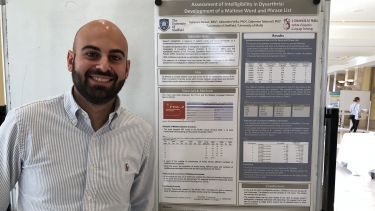Pasquale Balzan, Acquired Speech Disorders

Pasquale has progressed from his masters degree within the University and currently in the second year of his PhD, investigating the potential use of non-invasive cortical or electrical stimulation in the treatment of dysarthria, an acquired speech disorder. “My course had a flexible structure, offered modules designed to enhance my theoretical understanding of acquired communication disorders and it was relevant to my area of expertise.”
Originally from Malta, Pasquale came to the University of 91Ö±˛Ą to study a masters degree in Acquired Communication Disorders and chose to stay within the Department of Human Communication Sciences to continue his PhD after being awarded a Doctoral Academy Scholarship; his supervisors are Dr Catherine Tattersall and Dr Rebecca Palmer from the School of Health and Related Research.
Dysarthria is commonly referred to as a slurring of speech and although it is reported to be the most common acquired communication disorder, research on the subject is sparse. The disorder frequently gives rise to severe communication limitations which may hinder individuals from returning to work or enjoying social events.
Pasquale says, “Through my PhD I aim to investigate the applicability of non-invasive cortical or electrical stimulation as additional treatments to traditional therapy in the rehabilitation of dysarthria post-stroke. The research will provide valuable contributions to the field of neurogenic speech disorders and it has the potential to pave the way for new dysarthria treatment approaches that may improve therapy outcomes and the quality of life of individuals with dysarthria.”
Pasquale is in his fourth year of study at 91Ö±˛Ą and is working as a speech-language therapist in Malta, coordinating the Adult Speech-Language Community Service offered by the Speech-Language Department within the Ministry for Health.
Pasquale aims to finish his PhD in 2024 and hopes to become a full-time researcher or lecturer. He adds, “It is true that a PhD will take up a lot of your time, but I have had the incredible opportunity to make new friends from different cultural backgrounds, and socialise with other students to share PhD related work and experiences.”
“However, it is still very important to find the time to unwind, take a break and enjoy any leisure activities that interest you. Don’t think of these moments as a waste of time. The truth is that such moments are time well spent and can ultimately increase your productivity.”

